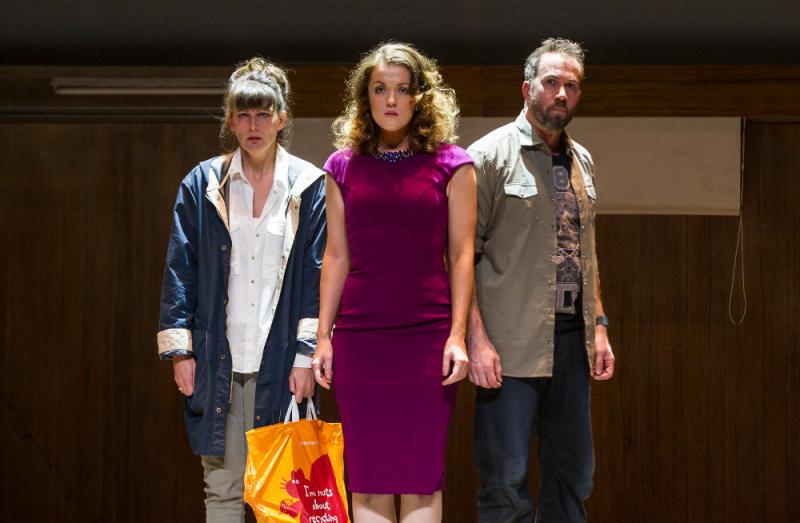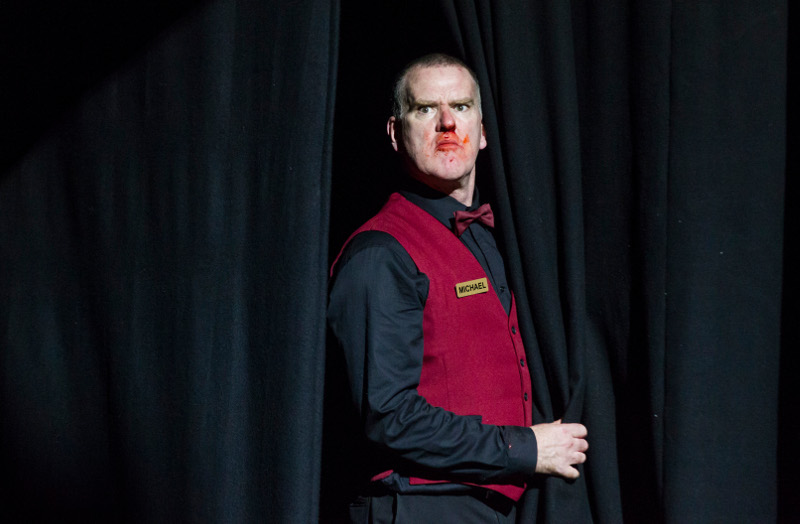The Last Hotel, Royal Lyceum, Edinburgh | reviews, news & interviews
The Last Hotel, Royal Lyceum, Edinburgh
The Last Hotel, Royal Lyceum, Edinburgh
Provocative new opera on assisted suicide from Enda Walsh and Donnacha Dennehy

Irish playwright Enda Walsh has been a regular presence at recent Edinburgh festivals – or, to be more precise, at the Fringe, with provocative works of rich linguistic lyricism including The Walworth Farce in 2007 and The New Electric Ballroom in 2008. This year marks his first foray into the Edinburgh International Festival, and it’s with a very different work.
A trio of awkward companions arrives at an anonymous hotel, staffed by a hyperactive caretaker (a magnificent physical performance from regular Walsh collaborator Mikel Murfi, pictured below). Their banal conversations grow increasingly strained as they dodge the issue in front of them; they stage a chilling rehearsal involving a seal-tight plastic bag and a canister of gas; and they dance at a crummy disco before the inevitable act the following day.
It’s a superb addition to the repertoire, rich, strange, darkly comic and thoroughly beguiling
It’s bleak, dismal stuff, but what makes Walsh and Dennehy’s opera so gripping is its volatile, alienating mix of the shocking and the bathetic. The woman who intends to end her life (sung with unnerving enthusiasm by a silver-toned Claudia Boyle) seems to lose consciousness with her head sealed inside a plastic bag, while elsewhere the man administering the gas (a powerful Robin Adams) sings in detail of the kitchen extension her fee will bring him. The woman callously rejects her children, while the trio weigh up the pros and cons of ferries versus planes.
Dennehy’s music – kind of Nyman-meets-Andriessen – follows a similar formula throughout, of building rippling post-minimalist textures through combining melodic cells across his pit ensemble, which adds the distinctive sounds of pan pipes, accordion and electric guitar to conventional strings, woodwind and brass. Dennehy switches textures and harmonies to describe contrasting characters, or builds to huge climaxes simply by adding more layers to his clouds of counterpoint. It’s simple, but highly effective – and made all the more alienating by the intrusion of warped pop music recordings (most memorably, B*Witched’s 1997 shocker "C’est la vie" for the hotel’s violent nightclub scene).
 His vocal writing is for the most part grateful and lyrical, if unpredictable, and his final duet, sung by the woman from beyond the grave alongside her executioner’s wife, reaches a kind of fractured ecstasy as both fantasise on simply no longer needing to care. Jamie Vartan’s startling stage design places the action in a drab backstage or hospital area littered with crushed plastic cups and suitcases – possibly memories of the people who have been here before this trio. André de Ridder conducts Dennehy’s own Crash Ensemble with swagger and enthusiasm, and they respond with a bright, urgent performance.
His vocal writing is for the most part grateful and lyrical, if unpredictable, and his final duet, sung by the woman from beyond the grave alongside her executioner’s wife, reaches a kind of fractured ecstasy as both fantasise on simply no longer needing to care. Jamie Vartan’s startling stage design places the action in a drab backstage or hospital area littered with crushed plastic cups and suitcases – possibly memories of the people who have been here before this trio. André de Ridder conducts Dennehy’s own Crash Ensemble with swagger and enthusiasm, and they respond with a bright, urgent performance.
New Festival director Fergus Linehan has admitted it’s an on-going financial challenge to bring large-scale staged opera to the Edinburgh International Festival, and that he’s seeking new ways of satisfying the demand for it. On the strength of Walsh and Dennehy’s challenging but hugely accomplished chamber opera, Linehan might just have found a new way forward. It’s a superb addition to the repertoire, rich, strange, darkly comic and thoroughly beguiling.
rating
Share this article
The future of Arts Journalism
You can stop theartsdesk.com closing!
We urgently need financing to survive. Our fundraising drive has thus far raised £49,000 but we need to reach £100,000 or we will be forced to close. Please contribute here: https://gofund.me/c3f6033d
And if you can forward this information to anyone who might assist, we’d be grateful.

Subscribe to theartsdesk.com
Thank you for continuing to read our work on theartsdesk.com. For unlimited access to every article in its entirety, including our archive of more than 15,000 pieces, we're asking for £5 per month or £40 per year. We feel it's a very good deal, and hope you do too.
To take a subscription now simply click here.
And if you're looking for that extra gift for a friend or family member, why not treat them to a theartsdesk.com gift subscription?
more Opera
 Tosca, Welsh National Opera review - a great company reduced to brilliance
The old warhorse made special by the basics
Tosca, Welsh National Opera review - a great company reduced to brilliance
The old warhorse made special by the basics
 BBC Proms: The Marriage of Figaro, Glyndebourne Festival review - merriment and menace
Strong Proms transfer for a robust and affecting show
BBC Proms: The Marriage of Figaro, Glyndebourne Festival review - merriment and menace
Strong Proms transfer for a robust and affecting show
 BBC Proms: Suor Angelica, LSO, Pappano review - earthly passion, heavenly grief
A Sister to remember blesses Puccini's convent tragedy
BBC Proms: Suor Angelica, LSO, Pappano review - earthly passion, heavenly grief
A Sister to remember blesses Puccini's convent tragedy
 Orpheus and Eurydice, Opera Queensland/SCO, Edinburgh International Festival 2025 review - dazzling, but distracting
Eye-popping acrobatics don’t always assist in Gluck’s quest for operatic truth
Orpheus and Eurydice, Opera Queensland/SCO, Edinburgh International Festival 2025 review - dazzling, but distracting
Eye-popping acrobatics don’t always assist in Gluck’s quest for operatic truth
 MARS, Irish National Opera review - silly space oddity with fun stretches
Cast, orchestra and production give Jennifer Walshe’s bold collage their all
MARS, Irish National Opera review - silly space oddity with fun stretches
Cast, orchestra and production give Jennifer Walshe’s bold collage their all
 Káťa Kabanová, Glyndebourne review - emotional concentration in a salle modulable
Janáček superbly done through or in spite of the symbolism
Káťa Kabanová, Glyndebourne review - emotional concentration in a salle modulable
Janáček superbly done through or in spite of the symbolism
 Buxton International Festival 2025 review - a lavish offering of smaller-scale work
Allison Cook stands out in a fascinating integrated double bill of Bernstein and Poulenc
Buxton International Festival 2025 review - a lavish offering of smaller-scale work
Allison Cook stands out in a fascinating integrated double bill of Bernstein and Poulenc
 Tosca, Clonter Opera review - beauty and integrity in miniature
Happy surprises and a convincing interpretation of Puccini for today
Tosca, Clonter Opera review - beauty and integrity in miniature
Happy surprises and a convincing interpretation of Puccini for today
 Hamlet, Buxton International Festival review - how to re-imagine re-imagined Shakespeare
Music comes first in very 19th century, very Romantic, very French operatic creation
Hamlet, Buxton International Festival review - how to re-imagine re-imagined Shakespeare
Music comes first in very 19th century, very Romantic, very French operatic creation
 Falstaff, Glyndebourne review - knockabout and nostalgia in postwar Windsor
A fat knight to remember, and snappy stagecraft, overcome some tedious waits
Falstaff, Glyndebourne review - knockabout and nostalgia in postwar Windsor
A fat knight to remember, and snappy stagecraft, overcome some tedious waits
 Salome, LSO, Pappano, Barbican review - a partnership in a million
Asmik Grigorian is vocal perfection in league with a great conductor and orchestra
Salome, LSO, Pappano, Barbican review - a partnership in a million
Asmik Grigorian is vocal perfection in league with a great conductor and orchestra
 Semele, Royal Opera review - unholy smoke
Style comes and goes in a justifiably dark treatment of Handelian myth
Semele, Royal Opera review - unholy smoke
Style comes and goes in a justifiably dark treatment of Handelian myth

Add comment